Charlie Hebdo attack: France tightens net in manhunt
- Published
Police arrived at a petrol station two hours behind the main suspects, as the BBC's Damian Grammaticas reports
Police are searching a rural region of northern France in the hunt for Islamist gunmen who attacked Charlie Hebdo magazine.
The hunt is focused on an area of Picardy where the two fugitives were reportedly last seen on Thursday morning when robbing a petrol station.
New vigils have been held worldwide for the 12 victims of Wednesday's massacre.
Muslim leaders have asked mosques across France to condemn the Islamist attack at Friday prayers.
Eight journalists, two police officers, a caretaker and a visitor died when two masked men armed with assault rifles burst into the Paris offices. Eleven people were wounded, four of them critically.
The attackers, who shouted Islamist slogans, are believed to have been angered by the satirical magazine's irreverent depictions of the Prophet Muhammad.
They are said to have shouted "We are al-Qaeda, Yemen", an apparent reference to the al-Qaeda in the Arabian Peninsula group (AQAP).
In the US, a senior official has told reporters that one of the two brothers alleged to have carried out the attack, Said Kouachi, spent "a few months" training in Yemen with the group.
He is thought to have trained in small arms combat and marksmanship.
Said and his younger brother, convicted terrorist Cherif Kouachi, were on a US no-fly list before the attack, a US counter-terrorism official told the New York Times, external.
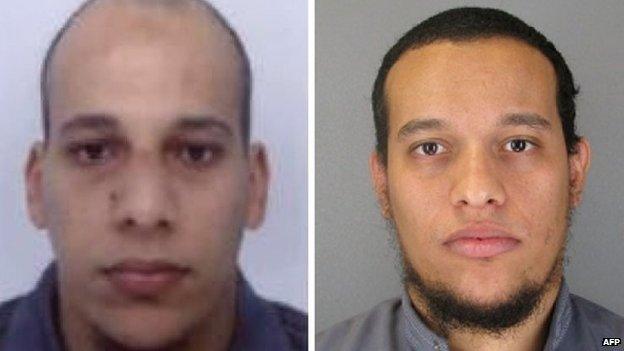
French police released photos of the Kouachi brothers - Cherif (L) and Said (R)
Night hunt
Overnight, helicopters flew over the search area in darkness for several hours in an area between the Aisne and the Oise rivers.
Armed and masked police kept local roads under surveillance. Earlier police commandos from the Raid and GIGN searched properties in the area house by house.
"[The police] think they have a leg-up at night because they have the technological advantage with heat-seeking technology," journalist Guillaume Debre told the BBC's Newsday programme.
There was, he said, a theory that the two suspects had ditched their car and were on foot. "The big fear for the police is that the two suspects would be able to reach the border with Belgium and would escape the country," he told the BBC.
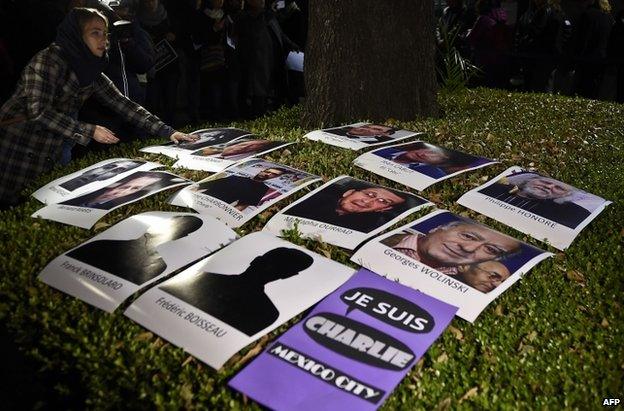
Portraits of the victims were laid outside the French embassy in Mexico City overnight
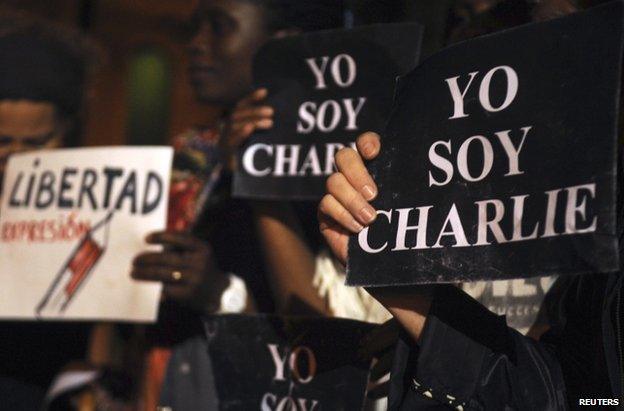
Placards reading "I am Charlie" in Spanish could be seen at a vigil in Santo Domingo
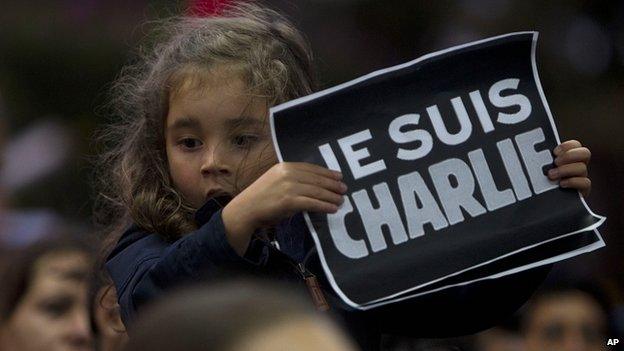
"Je suis Charlie" ("I am Charlie") has become a popular slogan at rallies like this one in Guatemala City
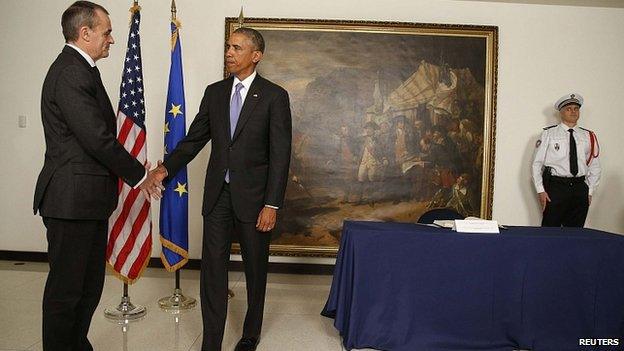
President Obama visited the French embassy in Washington, signing a book of condolence and meeting ambassador Gerard Araud
Cherif and Said Kouachi were born in Paris of Algerian parents.
Two men answering their description robbed a petrol station in Villers-Cotterets, about 80km (50 miles) north-east of Paris on Thursday and the station manager said they were heavily armed with Kalashnikovs and rocket-propelled grenade launchers.
They were last seen driving a Renault Clio car, believed to be the same vehicle they had hijacked in Paris after the attack.
Friday prayers
On Friday, the Council of Paris is due to hold an extraordinary meeting in which "Charlie Hebdo" will be made an honorary citizen of the city.
President Francois Hollande has appealed for tolerance and unity amid fears that underlying social tensions could be worsened by the attacks.
In an unusual move, he has invited the leader of the far-right National Front, Marine Le Pen, far-left leader Jean-Luc Melenchon and centrist Francois Bayrou to the Elysee Palace for talks.
Former Charlie Hebdo editor reflects on the "irreplaceable" talent of his friends and colleagues
France's main Muslim federations have called on imams at 2,300 French mosques to "condemn the violence and the terrorism with maximum firmness".
At least nine people connected to the Kouachi brothers have been detained in the towns of Reims and Charleville-Mezieres, as well as in the Paris area, French officials said.
The BBC's Fergal Keane visits the estate where one of the suspected gunmen lived
On Thursday, France marked a national day of mourning for the 12 people killed.
A minute's silence was held in public spaces and 20 imams joined hundreds gathered outside the offices of Charlie Hebdo to express sympathy for the victims. Later, the lights on the Eiffel Tower were turned off as a mark of respect.
Several thousand people gathered in the Place de la Republique in Paris for a second night, lighting candles and waving signs that read "Je suis Charlie" ("I am Charlie"). Other vigils were held across the world
The lawyer for Charlie Hebdo, Richard Malka, has said that next week's edition of the magazine will go ahead on Wednesday and will have a print run of one million instead of the normal 60,000 copies.
Politicians and journalists across the globe have widely condemned the shooting as an attack on freedom of speech and the press.

Charlie Hebdo attack sequence


Charlie Hebdo victims

Economist and regular magazine columnist Bernard Maris, 68, known to readers as Uncle Bernard
Cartoonists Georges Wolinski, 80, and Jean "Cabu" Cabut, 76
Charlie Hebdo editor and cartoonist Stephane "Charb" Charbonnier, 47, who had been living under police protection since receiving death threats
Cartoonists Bernard "Tignous" Verlhac, 57, and Philippe Honore, 73
Mustapha Ourrad, proof-reader
Elsa Cayat, psychoanalyst and columnist, the only woman killed
Michel Renaud, who was visiting from the city of Clermont-Ferrand
Frederic Boisseau, 42, caretaker, who was in the reception area at the time of the attack
Police officers Franck Brinsolaro, who acted as Charb's bodyguard, and Ahmed Merabet, 42, who was shot dead while on the ground.